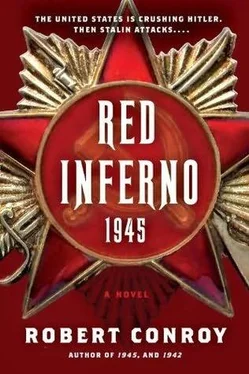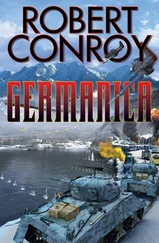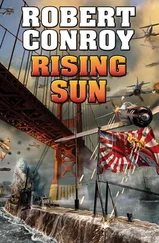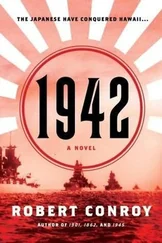Robert Conroy - Red Inferno
Здесь есть возможность читать онлайн «Robert Conroy - Red Inferno» весь текст электронной книги совершенно бесплатно (целиком полную версию без сокращений). В некоторых случаях можно слушать аудио, скачать через торрент в формате fb2 и присутствует краткое содержание. Жанр: Альтернативная история, на английском языке. Описание произведения, (предисловие) а так же отзывы посетителей доступны на портале библиотеки ЛибКат.
- Название:Red Inferno
- Автор:
- Жанр:
- Год:неизвестен
- ISBN:нет данных
- Рейтинг книги:4 / 5. Голосов: 1
-
Избранное:Добавить в избранное
- Отзывы:
-
Ваша оценка:
- 80
- 1
- 2
- 3
- 4
- 5
Red Inferno: краткое содержание, описание и аннотация
Предлагаем к чтению аннотацию, описание, краткое содержание или предисловие (зависит от того, что написал сам автор книги «Red Inferno»). Если вы не нашли необходимую информацию о книге — напишите в комментариях, мы постараемся отыскать её.
Red Inferno — читать онлайн бесплатно полную книгу (весь текст) целиком
Ниже представлен текст книги, разбитый по страницам. Система сохранения места последней прочитанной страницы, позволяет с удобством читать онлайн бесплатно книгу «Red Inferno», без необходимости каждый раз заново искать на чём Вы остановились. Поставьте закладку, и сможете в любой момент перейти на страницу, на которой закончили чтение.
Интервал:
Закладка:
He felt a tug at his sleeve. “Sir, what’s wrong with Aunt Lis?”
Von Schumann sighed. The girl had fainted and was being half carried, half dragged into a building by the women who had been holding her up. She was young and presumably healthy. Some food, rest, and water would help immeasurably. He remembered that the boy’s name was Pauli.
“Pauli, I’m sure all she needs is a little rest and some food.”
“Was I bad for eating her food?” the boy asked.
Von Schumann laughed at the innocence of children. It felt good to laugh. “No, Pauli, your Aunt Lis was very good for sharing it with you.”
CHAPTER 4
Harry Truman finished reading his briefing papers and put his wire-rimmed glasses on the desk. He was exhausted, but no more so than the man in front of him.
“General Marshall, what about our boys and Berlin?”
“Mr. President, they are still making progress, although it is much slower than we had hoped.”
“They’re not taking heavy casualties, are they? I don’t want that. Certainly not at this stage.” Truman had been having second thoughts about the decision to send soldiers toward Berlin. The realization that he was solely responsible for whatever befell those men was a heavy one.
“Actually no, sir. While there have been some casualties, the rate has been quite light. They are simply moving slowly and cautiously, checking for mines and possible ambushes. Also, the roads and bridges have been pounded by the Air Corps, so there’s quite a bit of maintenance to perform as they move out. They are just about ready to move into the suburbs of Berlin.”
Truman snorted. He hated the term light casualties. To him it was an oxymoron. Casualties were light unless, of course, you were one of them, in which case casualties just became heavy. He’d seen casualties firsthand as an artillery officer in World War I and hated the thought of causing them, light or not. He thought it was a good thing that America’s new president was actually a combat veteran who understood the human cost. Too many presidents, FDR included, had never seen real combat.
“At which point,” Truman said, “if I read these maps correctly, they will be very close to the northern arm of the Russian army.”
“Correct.”
Truman put his glasses back on and stared at his secretary of state, Ed Stettinius. “Ed, what about Stalin? Has he responded yet to our note?”
“Not yet, sir.”
Truman scowled. “I certainly hope the man has received it and has given his generals notice of our intentions.”
Stettinius almost looked affronted. “Sir, I handed it to Ambassador Gromyko myself. We also directed several other copies through the Swiss and the Swedes. He has it, sir. Stalin is just being his usual mysterious self.”
Marshall thought that Stalin was a little more devious than mysterious but held his tongue. Stalin’s intentions would become evident soon enough. He hoped to God that Colonel Burke’s assessment of Stalin’s aggressive intentions would prove wrong.
T HE S OVIET EMBASSY was housed in a large, old, and grim building on 16th Street in Washington, and the party was in full and rowdy swing when Steve Burke arrived with Natalie Holt on his arm. He noticed with amusement the number of Marxist-Leninists who were goggle-eyed at the sight of Natalie’s off-the-shoulder green silk dress, which showed both a wonderful shoulder and the hint of well-rounded cleavage. Due to the cloth shortages that decreed shorter hemlines, it also showed a surprising amount of extremely lovely leg. He couldn’t decide whether he liked their overt attention or was jealous. And why would he be jealous in the first place? It wasn’t like he and Natalie were engaged or anything. He decided he was acting like an adolescent.
“Natalie, I think they would like to coexist peacefully with you.”
“How charming,” she said, smiling affably, not at all put off by the stares. With her looks, he thought it was doubtless something she had gotten used to. “But they can’t have me, and it’s all their fault for eliminating the aristocracy. Now they have nothing to strive for.”
Invitations to the Soviet reception had not been difficult to get. Several had been left with the Russian section of the War Plans department and it would not have surprised Burke if he saw some of his colleagues bellying up to the very large and crowded open bar.
The party’s ostensible purpose was to commemorate both the arrival of a new cultural attache, who was doubtless a spy, and to celebrate what everyone was referring to as the Allies’ mutual final push on Berlin. When Berlin was finally taken, it was said, Hitler would be displayed in a cage in the Kremlin where he could spend the rest of his days sitting in his own shit. Would serve the bastard right, was the consensus, and Burke agreed.
Burke suspected that the real reason for the party was the fear that the war would be over and many of the Russian staffers sent home to their socialist paradises before all the booze in North America could be consumed. Tonight, the Reds were making a valiant effort to solve this horrendous problem. It was only nine in the evening and several Russians, civilian and military, were staggering about in advanced states of drunkenness.
Natalie squeezed his arm tightly as they navigated through the crowded hall and toward the buffet table. They each took a glass of champagne-decadent French, of course-and a plate of hors d’oeuvres.
Steve pushed a shrimp into his mouth. “Do the peasants eat this well in Minsk and Pinsk, I wonder?”
“Of course they do, Steven. Have you forgotten it’s a workers’ paradise? These are merely their leftovers shipped over to make us capitalist swine envious. I just can’t believe someone ate all the caviar already.”
“Ah,” he said and turned as a scuffle broke out across the room. He was beginning to have second thoughts about whether he should have asked her to accompany him as he heard the sound of glass breaking. His presence at the party was more or less a command from General Marshall’s office, because Marshall wanted several Russian experts to mingle and try to read what the Reds were doing and thinking. In particular, the higher-ups wanted to know of any stray thoughts or comments regarding the two divisions called Miller Force now en route to Berlin. This had been reported by various overzealous American newspapers as an attempt for the Americans to get there first and take the city. General Marshall was upset by this interpretation and had urged the State Department to further reassure the Russians that this was not the intent.
Burke’s immediate impression was that the effort to gather information was an utter waste of time. There were no major players from either government present this evening. No Gromyko, and nobody from the upper levels of the American or other Allied governments to set the tone and go through the elaborate dance of conveying messages via statecraft. Both the hosts and the guests were mid-level officials from a number of countries who were taking advantage of a free feed and the challenges of an inexhaustible supply of liquor.
“This is amazing,” Natalie said. “They’re behaving like there’s no tomorrow. Of course, if they’re sent back to the Soviet Union, they could be right.”
In the distance a small musical group began playing something that could scarcely be heard above the din and was barely identifiable as music.
A Russian officer whose name Burke scarcely remembered lurched drunkenly in his direction.
“Burke!” he said. The Russian’s breath was an alcoholic stench, and Steve recoiled while Natalie turned her head and laughed. “War almost over. We kill fucking Hitler, no?”
“Colonel Korzov, your English is improving remarkably.” Korzov rewarded Burke with a huge hug and lurched away, but not before trying to peer down the front of Natalie’s dress. He looked much like a three-legged bear.
Читать дальшеИнтервал:
Закладка:
Похожие книги на «Red Inferno»
Представляем Вашему вниманию похожие книги на «Red Inferno» списком для выбора. Мы отобрали схожую по названию и смыслу литературу в надежде предоставить читателям больше вариантов отыскать новые, интересные, ещё непрочитанные произведения.
Обсуждение, отзывы о книге «Red Inferno» и просто собственные мнения читателей. Оставьте ваши комментарии, напишите, что Вы думаете о произведении, его смысле или главных героях. Укажите что конкретно понравилось, а что нет, и почему Вы так считаете.












